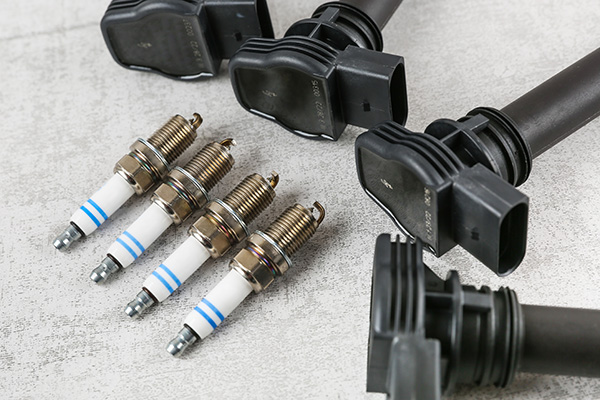
Ever wondered how your car starts and gets you moving? It all starts with a small yet crucial spark. The spark plugs and ignition coils in your car create the necessary spark that ignites the air-fuel mixture in the engine’s cylinders. Without them, your car wouldn’t run at all. While these components are tucked away under the hood and often forgotten until they malfunction, understanding how they work can help you appreciate the vital role they play in your vehicle's performance. Let’s examine how spark plugs and ignition coils work together to power your car.
The Role of Spark Plugs in Your Car’s Engine
Spark plugs are small, but they pack a big punch. Each spark plug is a crucial component responsible for igniting the air-fuel mixture inside your engine. Without a functioning spark plug, there’s no ignition, which means no power is generated. Every time you turn the key or press the start button in modern cars, spark plugs are working hard to ensure that the fuel combusts in the engine, creating the power needed to get your vehicle moving.
But how exactly do they do this? Spark plugs create a small but powerful electrical spark at the precise moment when the air and fuel mixture reaches the optimal pressure inside the combustion chamber. The timing is key—too early or too late, and your engine may misfire or perform inefficiently. Once the spark ignites the fuel, a controlled explosion takes place, driving the pistons and, ultimately, propelling the car forward.
The spark plug itself is made of durable materials designed to withstand the intense heat and pressure of the combustion process. However, over time, these plugs wear out. Deposits from fuel additives and carbon buildup can reduce their efficiency, leading to poor engine performance, increased fuel consumption, and rough idling.
What Exactly Are Ignition Coils?
While spark plugs handle the combustion process, they wouldn't be able to function without ignition coils. Ignition coils are essentially transformers that convert the battery's low voltage into the high voltage needed to create a spark. Most car batteries operate at around 12 volts, but to produce a spark strong enough to ignite the fuel-air mixture, much higher voltage is needed—often up to 20,000 volts or more. That's where the ignition coils come in.
Each ignition coil is connected to a spark plug and is responsible for sending high-voltage electricity to it at precisely the right moment. Without this, the spark plug wouldn’t be able to generate the spark needed to ignite the engine’s fuel.
In older vehicles, there used to be just one ignition coil for the entire engine. However, most modern vehicles, especially those with more advanced engines, have individual ignition coils for each cylinder. This direct ignition system increases reliability and efficiency because each spark plug gets its own dedicated source of high-voltage electricity.
How Spark Plugs and Ignition Coils Work Together
Spark plugs and ignition coils may seem like separate components, but they work together as part of your vehicle’s ignition system. When you turn on your car, the battery sends an electric current to the ignition coils. The coils then amplify this low voltage into high voltage, which is sent directly to the spark plugs.
At the exact right moment, this high-voltage current jumps across a small gap at the tip of the spark plug, creating the spark needed to ignite the air-fuel mixture inside the engine. Once the fuel ignites, it produces the energy needed to push the pistons down, driving the crankshaft and powering your car.
This process happens hundreds of times per minute as you drive, and it must occur at just the right time to ensure that your engine runs smoothly. If there’s a problem with either the spark plugs or ignition coils, you’ll likely notice a reduction in performance, misfiring, rough idling, or even trouble starting your car. In the worst cases, malfunctioning ignition components can cause damage to your engine or catalytic converter, which can lead to costly repairs.
Common Problems with Spark Plugs and Ignition Coils
Although they’re designed to last, spark plugs and ignition coils can wear out over time. Understanding the symptoms of a failing ignition system can help you catch issues early and avoid major engine problems. Here are some common signs that your spark plugs or ignition coils might need attention:
Engine Misfires
If the timing of the spark is off or the spark plug fails to ignite, you might experience engine misfires. This often results in a rough driving experience and a noticeable loss of power.
Poor Fuel Efficiency
Worn-out spark plugs or faulty ignition coils can cause your engine to burn more fuel than necessary. If you’ve noticed your gas mileage dropping for no apparent reason, it could be due to issues with these components.
Hard Starts or No Start
If your ignition system isn’t working properly, your car may struggle to start or fail to start at all. Ignition coils or spark plugs that are failing to produce a strong spark will make it difficult to get your engine going.
Rough Idling or Stalling
A misfiring engine can lead to rough idling, where the car feels like it’s vibrating or shaking when it’s at a standstill. In more severe cases, the engine might stall completely.
Is your car showing signs of a misfire or sluggish performance? Don’t wait! Bring your vehicle to Neighborhood Tire Pros for a professional ignition system inspection. We’ll check your spark plugs and ignition coils to keep your car running smoothly and efficiently.